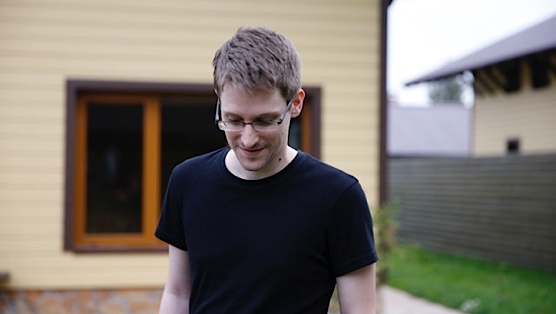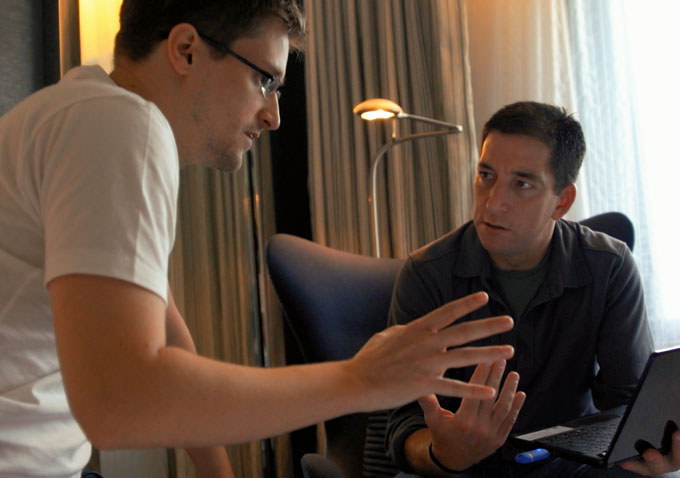By providing your information, you agree to our Terms of Use and our Privacy Policy. We use vendors that may also process your information to help provide our services. This site is protected by reCAPTCHA Enterprise and the Google Privacy Policy and Terms of Service apply.
Laura Poitras On ‘The Disturbing Realities’ of Edward Snowden’s Revelations (Part 2)
Eric Kohn

 Read the first part of our interview here and stay tuned for more coverage this week of “Citizenfour,” which opens in limited release this Friday.
Read the first part of our interview here and stay tuned for more coverage this week of “Citizenfour,” which opens in limited release this Friday.
With your previous films you’ve already expressed skepticism about the policies and actions of the American government. But even from that starting point, was there anything about Snowden’s revelations that surprised you?
In terms of my previous films, I usually begin with a set of ideas and interests, but they usually change when I begin shooting. They change because the people I spend time with change them. So I’m not just interested in telegraphing or imprinting my world view. I want to learn from people and see things on the ground. With the film I made in Iraq, I was very critical of the occupation and thought it was absurd that we were going to occupy that country in order to bring democracy. To me, that sounds laughable. But it’s actually quite serious when you meet Iraqis who risked dying in order to vote. You go, “OK, if they’re willing to die in order to vote, then there is something to be said here about the importance of self-determination and supporting Iraqis who want to engage.”
It’s easy to say this is a farce from the outside; it’s less easy when you see people who are willing to die in order to vote. There are these sort of complications that I’m interested in — that people can reach different conclusions, and people with different world views can come to a film and draw different conclusions. I think that’s a good thing.
READ MORE: ‘Citizenfour’ is a Bracing Look at Former NSA Whistleblower’s Impact
With this film, certainly I think it’s a problem that we have a secret court, secret interpretations of law and a secret watch list. These are all really disturbing realities that we’re living in during the post-9/11 era. I think we do need people to come forward. Ideally, our government doesn’t attempt to keep these things secrets. I have a direct experience with this — at the end of the film, we learn about this watch list, which has 1.2 million people on it. To me, it’s powerful that someone is bringing this information to the public. I’ve been on this watch list for years. Not only do I not know why I’m on this list — the government has never asked me any questions — but when I’ve tried to find out, the government’s position is, “We don’t acknowledge that this is a watch list.” That’s pretty Kafkaesque…so it’s possible now that somebody’s taken such risks to expose the watch list that legal challenges can come up to question it.
 Speaking of the Obama Administration, we don’t directly hear from anyone there in the film. Did you ever try to get someone from that side of the equation into the film?
Speaking of the Obama Administration, we don’t directly hear from anyone there in the film. Did you ever try to get someone from that side of the equation into the film?
Well, we do include Obama in the film during the third act…
Right, but that’s footage from a press conference. Did you ever try to speak to anyone one-on-one?
Given the type of filmmaking I do, I would need access. I don’t want to sit down for an interview that’s not interesting to me. I’m not interested in talking points. If the NSA wanted to let me into their facilities, I would love to include that in the film. But I don’t think that’s going to happen anytime soon.
But did you try?
I stayed with the protagonist I was following, which was Snowden and the journalist, and followed it from the perspective.
Did anyone from the Obama Administration reach out about possibly seeing the film?
From the government? No. I was never contacted by the U.S. government about anything relating to this film.
Since the Snowden revealed his identity, he’s been used by different groups with varying agendas. For the right, he’s ammo against Obama; the left is more inclined to connect these revelations with the Bush Administration. You seem to fall into the latter camp for the most part.
Obviously, these are policies that emerged out of Bush. What I find disturbing and frightening about Obama is the extent to which he’s advanced, normalized and institutionalized Bush policies. You have the expansion of surveillance, of course. Guantanamo’s still open. We’re bombing other countries. It’s not that Bush responded in an emergency situation by overreaching and then we sort of dialed it back. As we know, in the second World War, we put in camps a lot of Japanese-Americans, but they were let out. We didn’t keep those camps open. Yet Guantanamo’s still open. There are some things that Bush put in motion that are really frightening in terms of executive power, which Obama hasn’t dialed back. If he doesn’t do it, that makes it harder for the next person because it becomes institutionalized.
So no possibility of a White House screening, I gather.
It might be a little unlikely. I think it will be screened in the government, but I’m not sure it’ll be a White House screening.
The movie ends with all these events in motion. Do you see yourself tweaking the film further or directing another chapter?
It’s been an unusual experience to work on a film that was functioning as a long-form narrative that we wanted to function outside of the news. We’re not trying to use the film to break news because that would fall flat once the news is out. The scenes we chose had to have actual purpose in the narrative that we see. But things are happening that find their ways into the film and are translated into a cinematic context at warp speed. We’re releasing the film we wanted to release and I’m continuing to report and follow the different narratives. I’m not going to stop doing that.
But is the ending of the film definitive to you?
It’s definitive in the sense that the scene that we close on is one that, for me, communicates the theme of the film — the sacrifices people make to make information public. I wanted to push the conversation outside of the frame and I didn’t want it to end on a note of, “Here is what’s up with Snowden.” The act that he took has repercussions and reverberations that will be going on into the future. So I wanted to end on a note of non-closure.
 Do you expect more revelations on this scale to come out?
Do you expect more revelations on this scale to come out?
There are many people taking great risks to be sources for journalists. So I think that Snowden’s not the first or the last. That’s one of the messages of the film.
Snowden’s parents joined you onstage at the New York Film Festival and his father, Lonnie, delivered a supportive statement. In the past, he has been more skeptical of his son’s actions in interviews. What was your relationship with Lonnie as the film came together?
We were in touch through texting and tried to meet last time I was in New York and it just didn’t happen. So the first time we met was onstage. I can’t speak for how his relationship to this has changed. I definitely know that he feels very supportive of the choice Ed has made. And I think he’s learned from these revelations and they’ve changed his perspective on the government. But I don’t want to speak for him. It’s moving that when we invited them [to the premiere] and asked for permission to acknowledge them, they said yes. Of course they were deeply worried and concerned, as any parents would be.
There’s this terrific shot near the end of the movie where you see Snowden and his girlfriend cooking dinner. We’re naturally inclined to want to know more about their relationship, but you don’t give that to us, which speaks to the right to privacy at the root of his actions. But do you consider him a friend? Do you know him better than the aspects of him we see in the movie?
We don’t share that much personal information. I’m still in touch with him and ask him questions as I’m working on stories. He’s a source. He cares about this. But he doesn’t know the details of my personal life and I don’t know his. But in this case, I did learn that Lindsay [Mills, Snowden’s girlfriend] was there and I felt it was important to the film because of how much you see from what happens to him in Hong Kong. Also, for me, one of the most painful things was when the media went after her. How hard that must’ve been — your partner disappears, and then you basically have the media rummaging through your private life. It was pretty horrible. I was really glad they agreed to let me include that in the film, and I definitely wanted to take a respectful distance position from that. We didn’t want to open up a new chapter about her experience, but we did want the audience to know that they were together. It says a lot about both of them.
 Have you spoken with him since the film has screened for the public?
Have you spoken with him since the film has screened for the public?
I actually haven’t had time. This is the laptop that I use [points to Macbook]. But I have another machine that’s more secure. I tried to find him a couple of times but I didn’t see him.
READ MORE: Edward Snowden Speaks Out in ‘Citizenfour’ Trailer
By providing your information, you agree to our Terms of Use and our Privacy Policy. We use vendors that may also process your information to help provide our services. This site is protected by reCAPTCHA Enterprise and the Google Privacy Policy and Terms of Service apply.

















